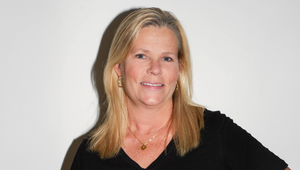
Another Tool in the Shop: Why We Should Keep Playing with AI

Last week, APAC’s advertising world descended on Busan in South Korea for the 2024 iteration of the MAD STARS festival of creativity.
The week’s theme, AI in Marketing, was consistently present in each day’s panels and speakers, with the rapidly developing technology central to the minds of the world’s creative community.
Miriam Wells, Ogilvy PR Australia chief creative officer, was in Busan for the festival to judge the ADSTARS awards presented on the final day. A strategic creative with diverse experience spanning PR, marketing, and content, she brings over 15 years of experience to her role.
During the festival, Miriam spoke to LBB’s Tom Loudon about the trend of AI in advertising campaigns. She emphasised that AI should be viewed as a tool rather than a cure-all and that our focus should be on leveraging AI to complement human creativity rather than replace it.
Miriam also discussed the ethical considerations of using Gen-AI, highlighting our responsibilities to safeguard the technology and its potential to enhance storytelling.
LBB> Are there processes Ogilvy PR Australia is looking to implement that involve AI, and if so, do you think they will be influenced by what you've seen here at Mad Stars?
Miriam> If I had $1 for every time I heard the word AI, I could happily retire. So yes, absolutely that is something we're looking into at Ogilvy and also at WPP more broadly.
I'm not an AI expert, but I am definitely part of the team that's exploring, experimenting, and playing. I think there's a great sense of play and experimentation around AI because of how it can work as a partner and eliminate the obvious in terms of ideation.
There's been a lot of talk at this festival about efficiencies and productivity. As a creative, that's not necessarily my North Star, but it's an interesting technological backdrop for what everyone's grappling with, and seeing how it will fit into workflows to make work faster, better, and ultimately lead to great creative leaps.
There’s obviously a lot of hype, but we have to remember to think of it as a tool, not a panacea.
LBB> Do you think there are specific opportunities or challenges for implementing AI in APAC?
Miriam> That's such a big question about such a diverse region, breaking down not only APAC but also considering the 70-odd years of AI technology everyone's already been using on their phones.
From my perspective, considering what we've seen on the jury, there's hardly any work where AI is the idea, and that feels really right to me. There are, however, some interesting cases where teams have used AI in a really smart way. But that’s AI featuring as a part of the workflow, whereas the work itself will be compelling because it gets to some human truth, or cultural truth, that makes the audience feel something.
At the end of the day, we're still awarding fantastic applications of other technology and traditional design. I don’t think any of that is going away.
LBB> Are there any examples or anything you can think of where AI has enhanced brand narratives within campaigns? And does this encroach on the role of creatives?
Miriam> I think it's just another one to add to the tool shop.
It's like any new technology, and we're at the toddler stage of playing and experimentation, where we want to use it for everything. I think creatives are naturally drawn to the new and the interesting. What’s new and exciting about this tool is that it’s so broad and varied in its applications – everything from developing new ways to synthesise information, to diagnose medical issues, to things like roasting your own Instagram profile.
I think everyone's in that play and discovery phase. I wasn't involved in this particular campaign, but I loved the work that the Ogilvy Melbourne team did for the Matildas and Football Australia. Using AI to tell stories and using the voices of players to tell the story to millions of young Matildas fans the morning after Australia's matches at the Olympics is a very cool use of AI.
LBB> But is there the risk that AI will not be good at cultural sensitivity or contributing to campaigns that resonate with a diverse audience? Or is that something AI could potentially be a much bigger part of in the future?
Miriam> Both of those could be right.
Ensuring that work is resonant, sensitive, and appropriate to your audience is always a critical consideration, whether you're writing or drawing something by hand or conducting a complete 360-degree, integrated campaign powered by AI.
It's not a silver bullet that will solve all that for you, but it's an interesting question to ask of the tool. But I think we always have to have an ethical lens on the inputs and the outputs – the person doesn't go away completely.
Looking at the work that's been awarded at MAD STARS this year and at other global award shows, AI is definitely having a moment, but it’s just one idea being recognised.
What's interesting about generative AI is that it puts an improved skill level in everyone's hands, which can be used for good or evil like any tool. When blogging blew up, it gave a voice to everyone who wanted a voice, and some amazing voices emerged. So did some average ones and some really terrible ones.
Putting tools in the hands of people who may not have deep skill sets allows some really cool stuff to emerge. Personally, I love the Balenciaga Pope and Harry Potter memes and videos that were going around. It’s a really interesting and weird concentration of culture.
LBB> Is there an acknowledgement at an organisational level of the ethical concerns of AI in an attempt to ensure its responsible use? And are organisations like Ogilvy PR well-positioned to respond to ethical concerns as they arise?
Miriam> I think technology always outstrips policy and legislation. You want to encourage innovation and experimentation, but not at a huge social or environmental cost.
We can't forget that these large language models have environmental costs in addition to potential privacy and ethical risks.
At Ogilvy, we are very strict about protecting our client's data, and that’s something to be cognisant of when training large language models. There are also biases you can potentially programme into the technology without even realising. When it comes to the ethics around AI, I think agencies and clients won't necessarily be positioned to solve them by themselves. But there's a role for everyone. There's a role for users to be informed, for agencies and industries to be asking these questions, and for governments and ethical bodies to safeguard the technology’s development.















